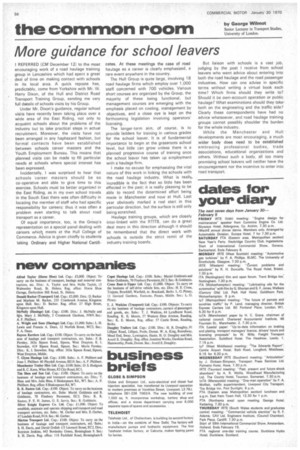the common room
Page 58

If you've noticed an error in this article please click here to report it so we can fix it.
More guidance for school leavers
by George Wilmot
I REFERRED (CM December 12) to the most encouraging work of a road haulage training group in Lancashire which had spent a great deal of time on making contact with schools in its local area. A quick reposte has. predictably, come from Yorkshire with Mr. W. Harry Dixon, of the Hull and District Road Transport Training Group, sending me very full details of schools visits by his Group.
Under Mr. Dixon's guidance, regular school visits have recently been taking place over a wide area of the East Riding, not only to acquaint schools about the problems of the industry but to take practical steps in actual recruitment. Moreover, the visits have not been arranged in any haphazard fashion, but formal contacts have been established between schools career masters and the Youth Employment Bureau. This means that planned visits can be made to fill particular needs at schools where special interest has been expressed.
Incidentally, I was surprised to hear that schools career masters should be so co -operative and able to give time to this exercise. Schools must be better organized in the East Riding, as in my own school travels in the South East there was often difficulty in locating the member of staff who had specific responsibility for careers; thus it was often a problem even starting to talk about road transport as a career.
Of equal importance, too, is the Group's representation on a special panel dealing with careers whict) meets at the Hull College of Commerce. Advice is given chiefly to students taking Ordinary and Higher National Certifi cates. At these meetings the case of road haulage as a career is clearly emphasized, a rare event anywhere in the country.
The Hull Group is quite large, involving 18 road haulage firms which employ over 1,000 staff concerned with 700 vehicles. Various short courses are organized by the Group, the maiority of these being functional, but management courses are emerging with the emphasis placed on costing, management by objectives, and a close eye is kept on the forthcoming legislation involving operators' licensing.
The longer-term aim, of course, is to provide ladders for training in various grades for the school leaver. It is of fundamental importance to begin at the grassroots school level, but little can grow unless there is a planned progressive course of training once the school leaver has taken up employment with a haulage firm.
I make no excuse for emphasizing the vital nature of this work in linking the schools with the road haulage industry. What is really_ incredible is the fact that so little has been effected in the past; it is really pleasing to be able to record the determined effort being made in Manchester and now at Hull. Last year obviously marked a real start in this particular direction, but the surface is still only being scratched.
Haulage training groups, which are closely inter-linked with the RTITB, can do a great deal more in this direction although it should be remembered that the direct work with schools is outside the strict remit of the industry training boards. But liaison with schools is a vast job, judging by the post I receive from school leavers who want advice about entering into both the road haulage and the road passenger industries. How can one advise in specific terms without writing a virtual book each time? Which firms should they write to? Should it be own-account operation or public haulage? What examinations should they take) both on the engineering and the traffic side? Clearly these correspondents have had no advice whatsoever, and road haulage training groups cannot possibly shoulder the burden for the whole industry.
While the Manchester and Hull developments are most encouraging, a much wider body does need to be established embracing professional bodies, trade associations, educational organizations and others. Without such a body, all too many promising school leavers will neither have the encouragement nor the incentive to enter into road transport.






























































































